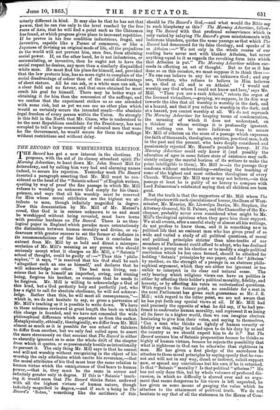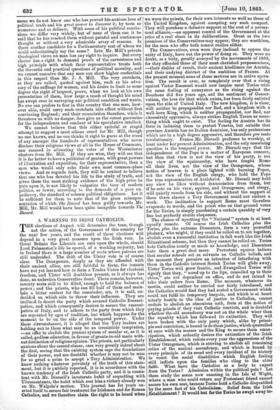THE RECORD ON THE WESTMINSTER ELECTION.
• MHE Record has got a new interest in the elections. It should be The Record's God,—and what would the Bible say to such blasphemy as this ? The Morning Advertiser, follow- ing The Record with that profound subservience which is only varied by inlaying The Record's gross misstatements with ludicrous blunders, quotes the same passage as that which The Record had denounced for its false theology, and speaks of it as Atheism :—" We not only in the whole course of our reading have never met with blanker Atheism, but never anything equal to it as regards the revolting form into which that Atheism is put." The Morning Advertiser seldom suc- ceeds in effecting an act of thought. But so far as it has done so on this occasion, we must suppose it to think thus :— ' No one can believe in any but an unknown God ; and any one, therefore, who refuses to believe in Him believes in no God at all and is an Atheist.' 'I would not worship any God whom I could not know and love,' says Mr. Mill. "Then you are a rank Atheist," retorts the organ of the licensed victuallers,—groping, we suppose, in its dim way towards the idea that all worship is worship in the dark, and at a hazard, and that if you refuse to worship in the dark, and at a hazard, you cannot worship at all. We do not reproach The Morning Advertiser for heaping terms of condemnation, the meaning of which it does not understand, on a thinker of whose writings it is professedly ignorant. But nothing can be more ludicrous than to accuse Mr. Mill of atheism on the score of a passage which expresses the faith of thousands, theologians, mystics, practical men, both in the past and the present, who have deeply considered and passionately rejected Mr. Mansel's peculiar heresy. If The Morning Advertiser could only know it (and possibly the education of ages in some future state of existence may suffi- ciently enlarge the mental horizon of its writers to make the point intelligible to them), Mr. Mill is—in the passage they condemn without understanding—enforcing the teaching of some of the highest and most orthodox theologians of every Church. Whatever Mr. Mill may or may not believe,—in this passage at least he is guilty of no heresy to compare with Lord Palmerston's celebrated saying that all children are born good.
But the truth is that the supporters of Mr. Mill whom The Recordquotes with such ejaculations of horror, the Dean of West- minster, Mr. Maurice, Mr. Llewelyn Davies, Mr. Stephen, the Attorney-General, Sir It. Palmer, and the Chancellor of the Ex- chequer, probably never even considered what might be Mr. Mill's theological opinions when they gave him their support. We at all events, after a careful study of almost all his writings, do not profess to know them, and it is something new in political life that an eminent man who has given proof of so wide and varied a study of all political questions, of moral and political principles stricter than nine-tenths of our members of Parliament could afford to adopt, who has declined to spend a penny on his election or to modify a single political conviction which he has once formed, should be attacked for holding ' Satanic' principles by one paper, and for ' Atheism ' by another, on the strength of a passage in an abstruse philo- sophical argument, which they are either too ignorant or too unfair to interpret in its clear and natural sense. The only bearing which religious views can have on politics is either by affecting their holder's political morality, fidelity, and honesty, or by affecting his votes on ecclesiastical questions. With regard to the former point, no candidate for a seat in the next Parliament has given such guarantees as Mr. J. S. Mill ; with regard to the latter point, we are not aware that he has put forth any special views at all. If Mr. Mill had said precisely the opposite of what he did say, if he had pro- fessed to undervalue human morality, and represent it as losing all its force in a higher world, then we can imagine electors hesitating to give him their votes, and saying to themselves, Can a man who thinks so lightly of human veracity or fidelity as this, really be relied upon to do his duty by us and the country as we should expect him to do it?' But The Record accuses him of Satanic propensities because he thinks so highly of human virtues, because he rejects the possibility that what is righteous in God can be otherwise than righteous in man. He has given a first pledge of the sacredness he attaches to these moral principles by saying openly that he can- not and will not in any way, direct or indirect, solicit support now, or spread any convictions but his own if he is returned. Is that " Satanic" morality ? Is that political " atheism ?" He has not only done this, but by whole volumes of profound dis- cussion, in which no difficulty is slurred over and no argu- ment that seems dangerous to his views is left unprobed, he has given us some means of gauging the value which he attaches to the attainment of political truth. We do not hesitate to say that of all the statesmen in the House of Coin- mons we do not know one who has proved his anxious love of political truth and his great power to discover it, by tests so numerous and so delicate. With some of his political conclu- sions we differ very widely, but of none of them can it be said that he has reached them without painful and continuous -thought or without a very admirable array of reasons. Is there another candidate for a Parliamentary seat of whom we could unhesitatingly say the same? Into Mr Mill's private theological views no man has any right to inquire. But every elector has a right to demand proofs of the earnestness and high principle with which their representative treats both the theoretic and practical questions of political morality, and we cannot conceive that any man can show higher credentials in this respect than Mr. J. S. Mill. The very crotchets, as they are called, quoted against him, such as his advo- cacy of the suffrage for women, and his desire to limit to some degree the right of bequest, prove, when we look at his own presentation of them, how large a reach of thought his mind has swept over in surveying our political condition and wants. No one can profess to fear in this country that one man, how- ever able, could carry such crotchets into effect without first convincing England ; and their enunciation therefore, while it threatens us with no danger, does give us the surest guarantee for the independence and candour of his speculative intellect.
We cannot believe that this either spiteful or stupid attempt to suggest a most odious creed for Mr. Mill, though no one knows, and no one thinks it right to guess at the creed of any amongst the hundreds of representatives who never disclose their religious views at all in the House of Commons, can succeed in alienating the votes of the Westminster electors from Mr. Mill. If they are wise, they will see that it is far better to have a politician of genius, with great powers of illustration and exposition, for their representative, than a man who would only echo their own most common-place views. And as regards faith, they will be content to believe that one who has devoted his life to the study of truth, and given them the most striking evidence of the high price he puts upon it, is not likely to vulgarize the tone of modern politics, or lower, according to the demands of a poor ex- pediency, the standard of solemn political obligations. Let it be sufficient for them to note that of the gross misrepre- sentation of which The Record has been guilty towards Mr. Mill, Mr. Mill would have been quite incapable towards The Record.































 Previous page
Previous page